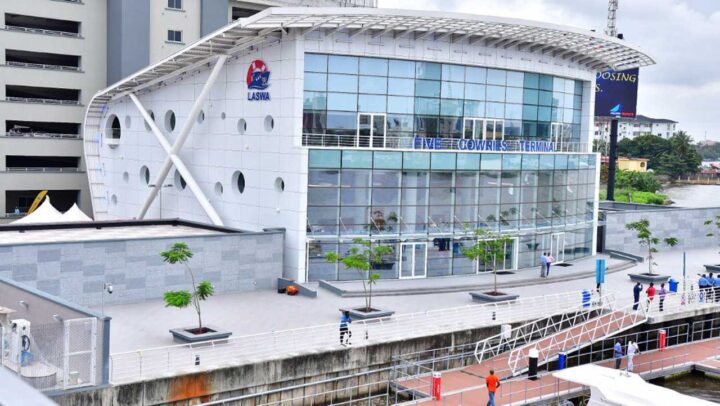The Lagos State Waterways Authority (LASWA) has entered into a strategic partnership with Pi-CNG, an energy and transport solutions provider, to promote the adoption of Compressed Natural Gas (CNG)-powered ferries as a sustainable alternative to conventional fuel-powered boats.
The initiative, which forms part of the state’s broader clean energy transition efforts, aims to reduce carbon emissions, cut fuel costs, and boost the safety and reliability of water transportation in Lagos.

The partnership was officially announced during a stakeholder engagement forum held in Lagos, where LASWA and Pi-CNG brought together key players in the maritime and energy sectors, including boat operators, jetty managers, regulatory agencies, and private ferry owners. The event provided a platform to demonstrate the benefits of CNG technology and showcase its viability as a more efficient, eco-friendly, and economically viable fuel option for inland water transport.
Speaking at the event, the General Manager of LASWA emphasized the importance of transitioning to cleaner energy sources, particularly in Lagos, where the waterways are becoming an increasingly important mode of transportation. He noted that the state government is committed to modernizing its water transport infrastructure and policies in a way that not only improves service delivery but also aligns with global climate goals and Nigeria’s commitment to reducing greenhouse gas emissions.
He highlighted that the reliance on petrol and diesel has posed challenges for waterway transport, including high fuel costs, engine inefficiencies, and environmental pollution. By shifting to CNG, ferry operators can expect lower operational costs, longer engine life, and reduced maintenance expenses. The transition, he noted, is not just a regulatory push but an economic opportunity for operators to improve margins while contributing to environmental sustainability.
Pi-CNG, in its presentation, showcased the technological framework for converting existing petrol- and diesel-powered engines into dual-fuel or full-CNG systems. According to the firm, its retrofit solutions have already been deployed in the road transport sector with measurable success, and the water transport adaptation is being piloted in Lagos with encouraging results. Company representatives explained how CNG is not only cleaner than petrol and diesel but also more cost-effective in the long term, with price stability and abundant domestic supply.
The company also expressed optimism about scaling up the initiative, noting that Nigeria’s growing CNG infrastructure network makes waterway deployment increasingly feasible. The representative added that the partnership with LASWA would help to identify high-traffic ferry routes and strategically target operators who are willing to transition voluntarily while also receiving technical support and incentives during the conversion process.
Boat operators at the forum raised questions regarding the cost of engine conversion, availability of CNG supply stations along the waterways, and safety concerns. In response, LASWA assured participants that the state was already working with private sector partners and federal agencies to establish shoreline fueling points and ensure regulatory compliance on safety standards. It also pledged to provide technical training, facilitate access to credit, and develop pilot schemes that would allow early adopters to evaluate the system’s benefits firsthand.
One operator, Tunde Bakare, who manages a fleet of ferries in the Ikorodu axis, said he welcomed the initiative, especially if supported with affordable financing and hands-on training. He noted that the rising cost of fuel and parts has made traditional ferry operations increasingly difficult to sustain, and any innovation that reduces operational costs would be a welcome development.
The move by LASWA comes at a time when governments across the globe are seeking alternative energy sources to reduce their carbon footprint and achieve sustainable mobility. In Lagos, where road congestion has become a daily struggle, water transport offers a vital relief channel for commuters. However, its growth has been hampered by underinvestment, poor regulatory enforcement, and outdated technology. By embracing CNG-powered ferries, LASWA is signaling a shift toward modernization and environmental consciousness in its water transport policies.
Experts believe the initiative has the potential to transform Lagos’ maritime transport landscape if properly implemented. They argue that Lagos, with its extensive coastline and lagoon network, is ideally positioned to pioneer green ferry operations in West Africa. With the right incentives, infrastructure, and regulatory support, ferry operators could see improved profit margins and greater public trust in water transport as a reliable alternative to road travel.
The partnership between LASWA and Pi-CNG is also expected to stimulate new business opportunities in the gas supply chain, engine conversion services, and maritime technology, contributing to job creation and local economic development. It also aligns with the federal government’s ongoing push to deepen the use of domestic gas as a cleaner alternative to imported fuels.
As the conversation around clean energy and sustainable transportation intensifies, Lagos appears ready to lead by example, starting with its own waterways. The success of this partnership could set a precedent for other coastal states in Nigeria to follow, using local innovation to tackle environmental challenges and build a more resilient transportation system. LASWA’s engagement with Pi-CNG represents not just a technical collaboration but a broader commitment to delivering safer, cleaner, and more efficient mobility for millions of residents.
Support InfoStride News' Credible Journalism: Only credible journalism can guarantee a fair, accountable and transparent society, including democracy and government. It involves a lot of efforts and money. We need your support. Click here to Donate
